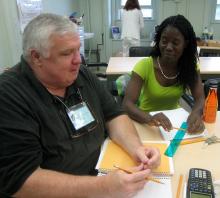Mathematics Learning Community
Impact
Accomplished
- Need Accomplished
- Evaluation Accomplished
- Sustainability Developing
- Replication & Scalability Developing
- Partnerships Accomplished
- Capacity Accomplished
- Challenging & Relevant Content Accomplished
- STEM Practices Accomplished
- Inspiration Accomplished
- Under-Represented Groups Developing

Design Principles
The programs in this database clear a high bar. STEMworks reviewed each program against the Design Principles for Effective STEM Philanthropy. Programs must be Accomplished () across all Design Principles, or be Developing (
) in a maximum of three areas.
Overarching Principles
-
Need Accomplished
Identify and target a compelling and well-defined need.
-
Evaluation Accomplished
Use rigorous evaluation to continuously measure and inform progress towards the compelling need identified.
-
Sustainability Developing
Ensure work is sustainable.
-
Replication & Scalability Developing
Demonstrate replicability and scalability.
-
Partnerships Accomplished
Create high impact partnerships.
-
Capacity Accomplished
Ensure organizational capacity to achieve goals.
STEM Principles
-
Challenging & Relevant Content Accomplished
Offer challenging and relevant STEM content for the target audience.
-
STEM Practices Accomplished
Incorporate and encourage STEM practices.
-
Inspiration Accomplished
Inspire interest and engagement in STEM.
-
Under-Represented Groups Developing
Identify and address the needs of under-represented groups.
Program Overview
The Mathematics Learning Community (MLC) helps teachers understand how students learn about specific concepts in mathematics. Teachers collaborate to review students’ work, identify where students are misunderstanding critical concepts, and devise more targeted strategies to address students’ needs. The Regional Science Resource Center (RSRC) at the University of Massachusetts Medical School has developed and piloted Mathematics Learning Community (MLC) professional development materials in Massachusetts. These materials provide the structure and content to facilitate school-based discussions among teachers and staff about how students understand, express and think about mathematics. MLC materials allow teachers to probe student thinking by learning how to examine student work with a diagnostic eye and then have meaningful collegial conversations about what they have discovered. As a result, those teachers learn to diagnose and better target students’ learning needs. MLC materials are aligned to the Intel Math curriculum and the Common Core State Standards for Mathematical Practice. Skilled facilitation is required to ensure the effectiveness of a school-based MLC. Facilitator Training is built on the premise that the training group acts as a model MLC. Through this approach, facilitators can experience first-hand the questions, solutions, student ideas, and mathematics that will be discussed.
Funders and Partners
MA Department of Elementary and Secondary Education, Intel Foundation, Noyce Foundation